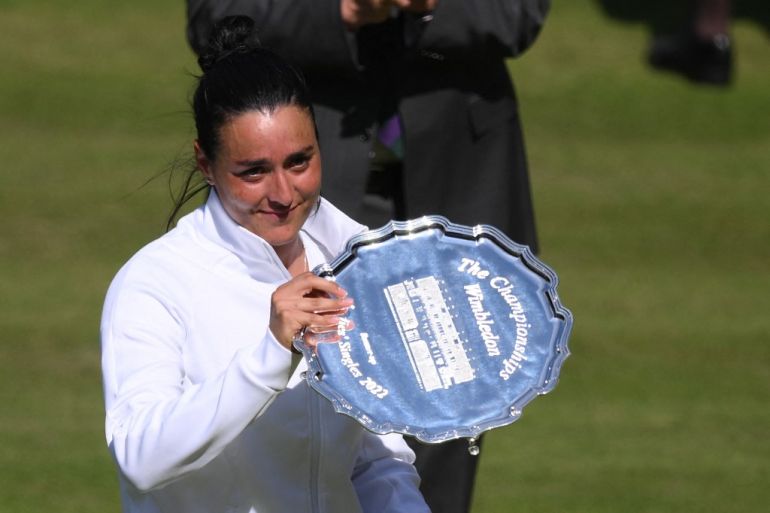Tunisia’s Ons Jabeur loses to Rybakina of Kazakhstan at Wimbledon
Jabeur had aimed to become the first player from the Arab world and the first African woman to win a Slam singles title.

Tunisia’s Ons Jabeur lost to Elena Rybakina of Kazakhstan 3-6, 6-2, 6-2, in the Wimbledon final, dashing Arab hopes that she would become the first from the region to win a grand slam singles title.
Russia-born Rybakina, the 17th seed who has been representing Kazakhstan since 2018, claimed her biggest career success on Saturday, after one hour 47 minutes, on her first match point for her third title overall.
Keep reading
list of 3 itemsTunisia’s Ons Jabeur first Arab player to reach Wimbledon semis
Jabeur loses to Sabalenka in bid for Wimbledon semis
Third-seed Jabeur had aimed to become the first player from the Arab world and the first African woman to win a Slam singles title in the professional era, which dates to 1968.
The 23-year-old Rybakina received the Venus Rosewater Dish from the Duchess of Kent after her remarkable comeback.
Rybakina said, speaking in the direction of Jabeur: “I want to thank Ons for the great match and everything you achieved. I think you are an inspiration for everybody. You have an amazing game, it was a joy to play against you and I learned so much today.
Jabeur leads the women’s tour with 13 victories in three-setters this season, but Rybakina came out far stronger in the decider on Saturday.
Jabeur also was participating in her first Grand Slam final.
“She deserved this. Hopefully, next time will be mine,” said Jabeur, whose exuberance on the court and personality off it have earned her the sobriquet “Minister of Happiness”.
“Elena stole my title,” Jabeur joked, “but it’s OK.”
“I love this tournament. I feel really sad but in tennis, there is only one winner. I’m trying to inspire people from my country. I hope they are listening,” she said.
Jabeur, 27, had the better start and won seven points in a row as she broke in the third game en route to a 3-1 lead and then went one set up with another eight unanswered points in the final two games.
But Rybakina converted her first break point in the opening game of the second set, saved four break points in her next two service games, and levelled the sets two games later with an ace.
Rybakina kept up the momentum and broke Jabeur again at the start of the decider with a volley winner.
She then fought from 0-40 down on her serve to hold for 4-2 with five unanswered points en route to victory two games later.
Jabeur finished with 24 unforced errors after a mere six in the first set while Rybakina’s more risky game saw her compile 33 unforced errors but also 29 winners, 12 more than her competitor.